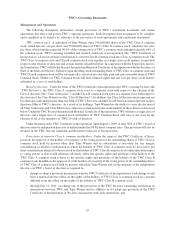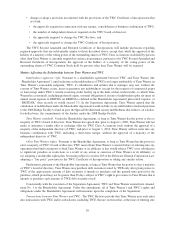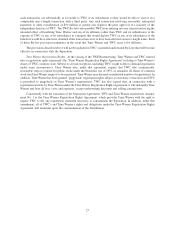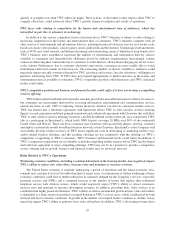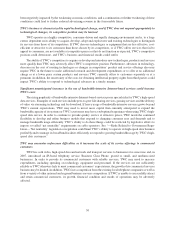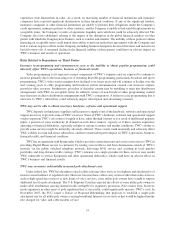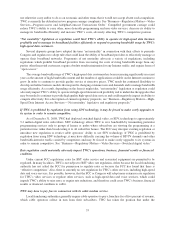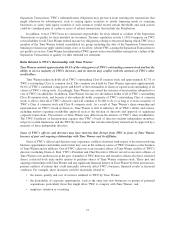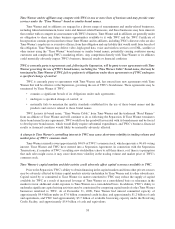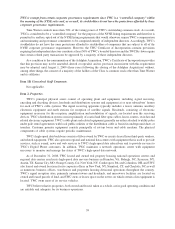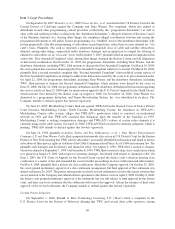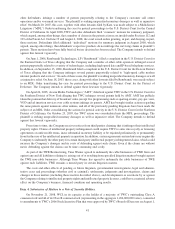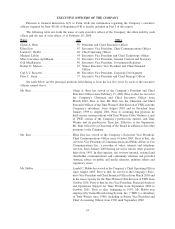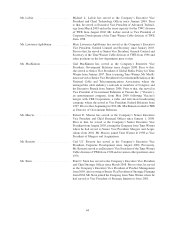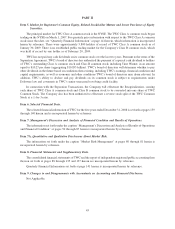Time Warner Cable 2008 Annual Report Download - page 45
Download and view the complete annual report
Please find page 45 of the 2008 Time Warner Cable annual report below. You can navigate through the pages in the report by either clicking on the pages listed below, or by using the keyword search tool below to find specific information within the annual report.not otherwise carry and/or to do so on economic and other terms that it would not accept absent such compulsion.
TWC is currently the defendant in two program carriage complaints. See “Business—Regulatory Matters—Video
Services—Program access and Adelphia/Comcast Transactions Order.” Compelled government carriage could
reduce TWC’s ability to carry other, more desirable programming and non-video services, decrease its ability to
manage its bandwidth efficiently and increase TWC’s costs, adversely affecting TWC’s competitive position.
“Net neutrality” legislation or regulation could limit TWC’s ability to operate its high-speed data business
profitably and to manage its broadband facilities efficiently to respond to growing bandwidth usage by TWC’s
high-speed data customers.
Several disparate groups have adopted the term “net neutrality” in connection with their efforts to persuade
Congress and regulators to adopt rules that could limit the ability of broadband providers to effectively manage or
operate their broadband networks. Proponents of net neutrality advocate a variety of regulations, including
regulations which prohibit broadband providers from recovering the costs of rising bandwidth usage from any
parties other than retail customers; require absolute nondiscrimination for any Internet traffic; and require forms of
“open access.”
The average bandwidth usage of TWC’s high-speed data customers has been increasing significantly in recent
years as the amount of high-bandwidth content and the number of applications available on the Internet continue to
grow. In order to continue to provide quality service at attractive prices, TWC needs the continued flexibility to
develop and refine business models that respond to changing consumer uses and demands and to manage bandwidth
usage efficiently. As a result, depending on the form it might take, “net neutrality” legislation or regulation could
adversely impact TWC’s ability to operate its high-speed data network profitably and to undertake the upgrades that
may be needed to continue to provide high quality high-speed data services and could negatively impact its ability to
compete effectively. For a description of current regulatory proposals, see “Business—Regulatory Matters—High-
Speed Data Internet Access Services—‘Net neutrality’ legislative and regulatory proposals.”
If TWC is prohibited by regulation from using SDV technology, it may be forced to make costly upgrades to
its system in order to remain competitive.
As of December 31, 2008, TWC had deployed switched digital video, or SDV, technology to approximately
5.2 million digital video subscribers. SDV technology allows TWC to save bandwidth by transmitting particular
programming services only to groups of homes or nodes where subscribers are viewing the programming at a
particular time rather than broadcasting it to all subscriber homes. The FCC may interpret existing regulation or
introduce new regulation to restrict cable operators’ ability to use SDV technology. If TWC is prohibited by
regulation from using SDV technology, it may have difficulty carrying the volume of HDTV channels and other
bandwidth-intensive traffic carried by competitors and may be forced to make costly upgrades to its systems in
order to remain competitive. See “Business—Regulatory Matters—Video Services—Switched digital video.”
Rate regulation could materially adversely impact TWC’s operations, business, financial results or financial
condition.
Under current FCC regulations, rates for BST video service and associated equipment are permitted to be
regulated. In many localities, TWC is not subject to BST video rate regulation, either because the local franchising
authority has not asked the FCC for permission to regulate rates or because the FCC has found that there is
“effective competition.” Also, there is currently no rate regulation for TWC’s other services, including high-speed
data and voice services. It is possible, however, that the FCC or Congress will adopt more extensive rate regulation
for TWC’s video services or regulate other services, such as high-speed data and voice services, which could
impede TWC’s ability to raise rates, or require rate reductions, and therefore could cause TWC’s business, financial
results or financial condition to suffer.
TWC may have to pay fees in connection with its cable modem service.
Local franchising authorities generally require cable operators to pay a franchise fee of five percent of revenue,
which cable operators collect in turn from their subscribers. TWC has taken the position that under the
35


